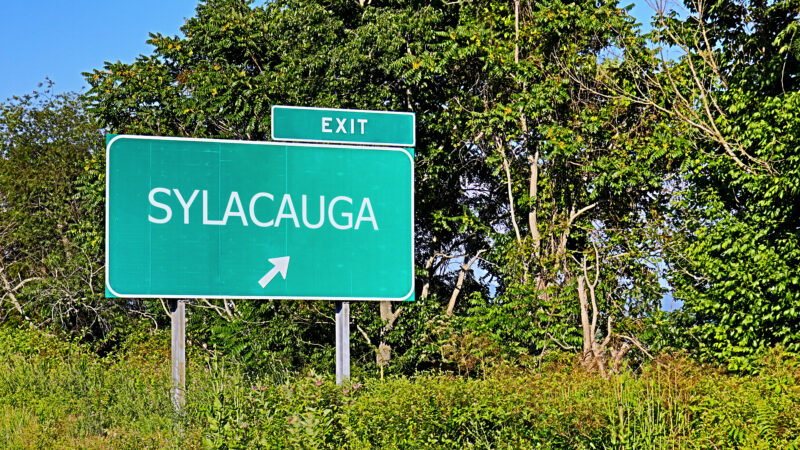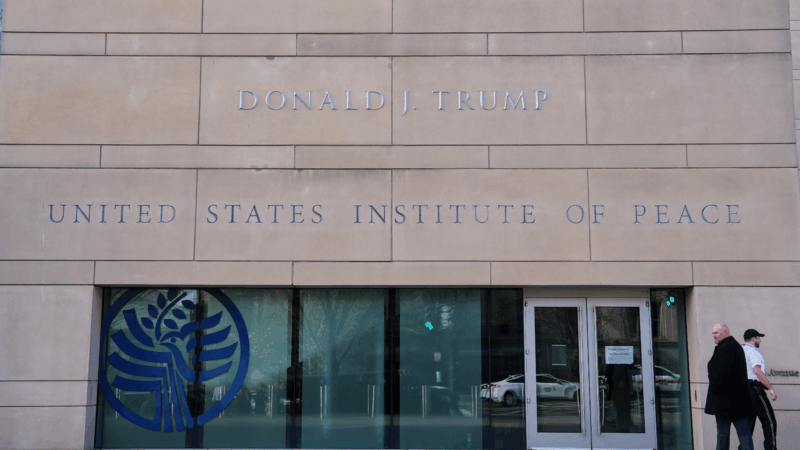The anatomy of a rumor about migrants in Sylacauga
During the presidential debate, former President Donald Trump gave light to a conspiracy theory about an influx of Haitian migrants. His comments created a sense of panic in many cities around the country – including in one small city in Alabama: Sylacauga.
This fall, Sylacauga, Alabama, found itself in an uproar. The city gained national attention for what was characterized by some as an invasion of Haitian migrants. But the reality was much more benign, with only a few dozen migrants actually in the city. The Atlantic staff writer, Elaina Plott Calabro, reported on the incident.
Plott Calabro is a Tuscaloosa-native, so she was curious if the broader conversation concerning Haitian migrants was trickling down into the state.
“I wanted to do a story seeing how a town as small as Sylacauga – just right around 12,500 people – was coping with what was portrayed online at that point as an actual invasion.”
Through her research from Washington D.C., she was coming up empty handed.
“So few people that I could connect with had ever actually seen the Haitian migrants themselves on the streets, so I thought ‘Well, I’d just like to go and see it for myself.’”
Once she arrived in Sylacauga, she became fascinated by the disconnect between the invasion that was being documented online, versus what she was seeing in the city. Although there were Facebook groups devoted to figuring out how Haitian migrants were getting into Sylacauga, many of the people she spoke with didn’t have strong comments on the matter.
“What I found in Sylacauga is that people I would speak to just one-on-one, they either didn’t want to talk to me about it at all, and we’re usually quite polite about it, or their comments were sort of offhand like, ‘I don’t really have many thoughts.’”
Plott Calabro said she thinks this panic was incited through Facebook.
“These alternate universes are created and fueled often through Facebook when it comes to hyperlocal communities. Residents themselves, as they go about their daily lives, are really not seeing a drastic change in their own daily routines.”
Their lives appeared to be unchanged despite this invasion that they referred to online. And, Plott Calabro said they often discussed the supposed invasion in hateful ways.
A theme in Plott Calabro’s report is conspiracy. She found the air of conspiracy that shrouded the town was due to rumors proliferated by these online groups.
“I became really fascinated by the anatomy of a rumor. What was the thing that catalyzed the hysteria, the panic?”
To get to the bottom of it, she spoke with the Sylacauga Mayor Jim Heigl. He released a statement in August denouncing claims that Sylacauga had become a sanctuary city. Plott Calabro asked him what prompted the need for a statement.
“What I found interesting was that he couldn’t really tell me. He just knew that suddenly his office was getting inundated with phone calls.”
She learned that the rumors began when a poultry processing plant in Albertville, 85 miles to the north, began bussing their workers to-and-from the plant.
“That is what I think really picked up on Facebook. People wondering who these people are, where they’re coming from. That’s where the conspiracy began that these are migrants that the federal government is bussing in to overwhelm communities.”
But she wanted to emphasize the distinction between those swept up in a virtual panic, and those who had sincere concerns about the community’s resources. She said some were worried about labor trafficking.
“In May, the Department of Labor filed suit against three Alabama companies for labor violations, including the illegal use of child labor. Reuters reported that many of those children were actually migrants.”
How this is affecting the migrants
The Haitian migrants Plott Calabro spoke with chose to remain anonymous in her piece. She said they’re aware of the stir their arrival has caused. When she spoke with the city council president, Tiffany Nix, she learned that they want to prove themselves.
“Nix was telling me that the first time she visited with many of them at the house they live in, their first instinct was to go and show her their papers and just sort of make clear ‘We don’t want handouts, we’re not looking for anything for free. We just want to work.’”
Plott Calabro detected a bit of defensiveness, which she said was understandable.
“I completely understood why at first they seemed reluctant to sit down with me. And so it was only after I made assurances that we would not use their name, there would be no photographs, there was not a television camera crew lurking in the corner about to come out that they agreed to talk with me about their experience.”
She said the migrant population is one of the most vulnerable, but oftentimes their situation here is better than the one they came from.
“That for them it’s not a huge affront if they’re sleeping side by side on an air mattress purchased from Walmart on the floor of a small duplex, because it is legions better than what they had experienced in their home country or wherever it was that they had just been.”
The Haitians’ day-to-day lives were like any Alabamians’, she said. She felt it important to highlight that in her article.
“I say this also as somebody who was born and raised and still has family in Alabama. It sounds a lot like members of my family too, which I think gets at what the migrants themselves have tried to communicate.”
She believes these similarities are why the media has moved from Sylacauga.
“There are no more Fox News segments about the invasion underway there because at a certain point I think it’s difficult for residents to simply ignore the kind of calm and unchanged nature of the town that they knew, even before the migrants had arrived.”
Click here to read Plott Calabro’s story in The Atlantic.
Iran and the U.S. lean into gunboat diplomacy as nuclear talks hang in balance
Iran and the United States leaned into gunboat diplomacy Thursday, with Tehran holding drills with Russia and the Americans bringing another aircraft carrier closer to the Mideast.
Former South Korean President Yoon receives life sentence for imposing martial law
Former President Yoon Suk Yeol was sentenced to life in prison for his brief imposition of martial law in December 2024.
José María Balcázar becomes Peru’s eighth president in a decade
José María Balcázar has become Peru's new interim president, replacing another interim leader who was removed over corruption allegations just four months into his term.
Trump gathers members of Board of Peace for first meeting, with some U.S. allies wary
President Donald Trump will gather Thursday with representatives from more than two dozen countries that have joined his Board of Peace, for a meeting that will focus on the reconstruction of Gaza.
With a win over Sweden, the U.S. men’s hockey team will play for an Olympic medal
A thrilling overtime goal by defenseman Quinn Hughes puts Team USA through to a semifinal game against Slovakia. On the other side of the bracket, Canada had its own close call, but moves on to face Finland.
Zuckerberg grilled about Meta’s strategy to target ‘teens’ and ‘tweens’
The billionaire tech mogul's testimony was part of a landmark social media addiction trial in Los Angeles. The jury's verdict in the case could shape how some 1,600 other pending cases from families and school districts are resolved.







